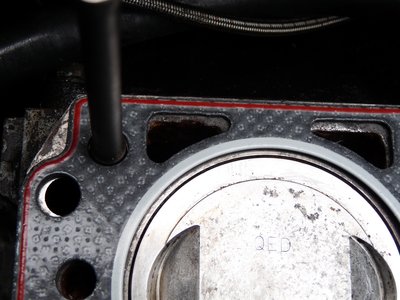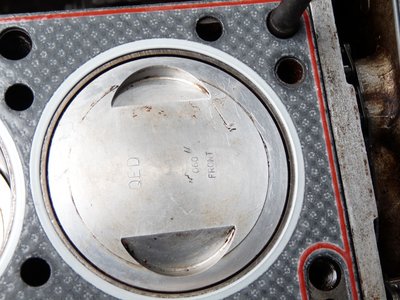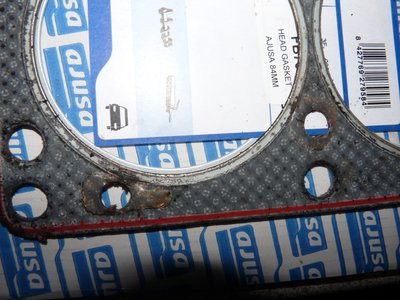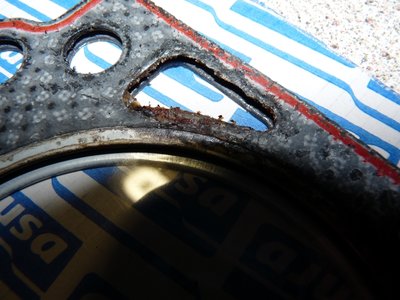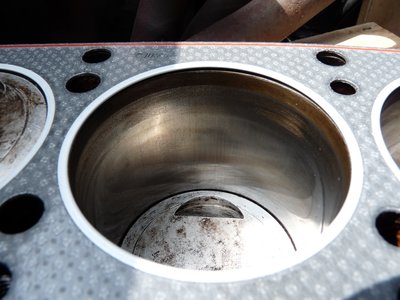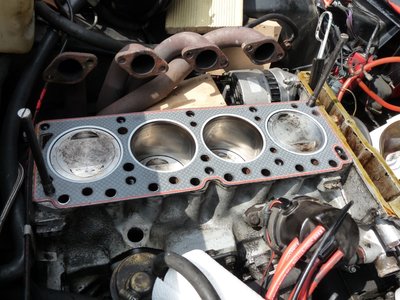Which head gasket set?
40 posts
• Page 1 of 3 • 1, 2, 3
Hi
Is there a particular brand or supplier for the head gasket set that people recommend? I'm reluctant to go Cometic as it is very expensive. (My bores appear to be +.020 and I understand that it's OK to use a standard head gasket.)
Thanks
JonB
Is there a particular brand or supplier for the head gasket set that people recommend? I'm reluctant to go Cometic as it is very expensive. (My bores appear to be +.020 and I understand that it's OK to use a standard head gasket.)
Thanks
JonB
-

JonB - Coveted Fifth Gear

- Posts: 2357
- Joined: 14 Nov 2017
On the +2 i went through a bit of a spate of head gaskets, for some reason the copper type one wouldn't fully seal so i went with a Ajusa gasket (from Burton Ford) which has been fine ever since....... the 2 seater has a Felpro again from Burton but i believe they only come in stock bore sizes.
I have used a few Cometic gaskets on YB engines before now and they have performed outstandingly well but as your aware they would be massive overkill on a Twincam. I had some issues with the Cometic cam cover gasket (twin cam) as they have no tolerance for warpage.
I have used a few Cometic gaskets on YB engines before now and they have performed outstandingly well but as your aware they would be massive overkill on a Twincam. I had some issues with the Cometic cam cover gasket (twin cam) as they have no tolerance for warpage.
Chris
-

Grizzly - Coveted Fifth Gear

- Posts: 1862
- Joined: 13 Jun 2010
I hadn't realised there was such a choice with tc head gaskets. I've always just used whatever the std gasket is that PM supplies and, if there's a sealing problem, put the blame on the block / head / my technique being below par.
At the moment I don't have a problem and it all seems to be sealing well but based on past experience it's only a matter of time before something upsets it - the water pump most likely as it's now about 8yrs old. If and when I do need to delve around those regions are there any factors I should take into account when buying the next one? What makes one gasket better than another - are we talking street vs track or something else. My engine's on (relinered) std bores so I guess 'oversize' isn't a concern.
I see El-Saturn has decided to go with a used gasket. Again, I've always used these things as one shot and never reused one. Are there exceptions to that rule? Can you use them again?
At the moment I don't have a problem and it all seems to be sealing well but based on past experience it's only a matter of time before something upsets it - the water pump most likely as it's now about 8yrs old. If and when I do need to delve around those regions are there any factors I should take into account when buying the next one? What makes one gasket better than another - are we talking street vs track or something else. My engine's on (relinered) std bores so I guess 'oversize' isn't a concern.
I see El-Saturn has decided to go with a used gasket. Again, I've always used these things as one shot and never reused one. Are there exceptions to that rule? Can you use them again?
Stuart Holding
Thame UK / Alpe D'Huez France
69 S4 FHC
Honda GoldWing 1800
Honda CBX1000
Kawasaki H1 500
Yamaha XS2
Thame UK / Alpe D'Huez France
69 S4 FHC
Honda GoldWing 1800
Honda CBX1000
Kawasaki H1 500
Yamaha XS2
- 69S4
- Coveted Fifth Gear

- Posts: 1124
- Joined: 23 Sep 2004
69S4 wrote:I hadn't realised there was such a choice with tc head gaskets. I've always just used whatever the std gasket is that PM supplies and, if there's a sealing problem, put the blame on the block / head / my technique being below par.
When i say i had sealing issues, i always leakage test after any major job. It could have run fine but it failed the leakage test so never actually saw the road. As for Block and head issues, i did carefully check before assembly and i used dowels to hold the gasket in position while lowering the head slowly which was why i was confident the gasket was in the correct place.
It must be possible to make a copper gasket seal but it's a dam sight easier to just use a more modern gasket.
Chris
-

Grizzly - Coveted Fifth Gear

- Posts: 1862
- Joined: 13 Jun 2010
There are three generations of general head gasket technology that span from the original twink design until today (if you ignore other more specialised means of sealing a head to a block)
i.e.
1. 1960's original twin cam technology -- Copper / steel sheet with a layer in between that was originally asbestos but i don't know what they use today. These are typically supplied by the usual suspects as head gasket replacements and can work OK assuming they are not too cheap a no name brand knock off.
2. 1980's -Composite fibre with a steel fire ring such as supplied by Ajusa and others. The locally made ones I use have an aluminium "paint" sealer on top and bottom surface which I see the Ajusa ones do not have. Mine require no sealant on the gasket and i dont know what Ajusa and others recommend but I would follow the manufacturers instructions
3. 2000's - Multi layer steel with a synthetic rubber compound between the layers (MLS) such as made by Cometic
In my experience the Composite fibre gasket technology works best in a twin cam as it is more compliant and does not require a very rigid head to seal effectively for both the cylinder pressure and the water and oil passages. The flexibility of the twin cam head compared to a cast iron old style head or modern alloy head is the biggest issue with getting it to seal with any gasket and I believe this style gasket works best.
Standard thickness gaskets in both the original design and especially the MLS design are a much stiffer gasket compared to the composite fibre gasket and can be challenging to get to seal. A thicker MLS gasket with more layers of rubber and steel will be more flexible and easier to seal and useful if the head has been skimmed a lot and you need to reduce the compression ratio and should be easier to get to seal.
Having said all the above no head gasket will seal if you dont install and torque it ( and re-Torque it after running ) correctly and if the head and block surfaces are not flat and finished to the required standard of roughness
Reusing a head gasket is not a good idea especially for generations 1 and 2 as the gasket takes a "set" on compression with permanent deformation and will struggle to reseal due to that. The generation 3 MLS gaskets theoretically can be reused as they dont take the same "set" on use as the compression is taken by elastic deformation of the rubber layers and they should spring back to near their original unused thickness which the other don't. However given their challenging sealing characteristics on a Twin cam to begin with a used one will be even more challenging
cheers
Rohan
i.e.
1. 1960's original twin cam technology -- Copper / steel sheet with a layer in between that was originally asbestos but i don't know what they use today. These are typically supplied by the usual suspects as head gasket replacements and can work OK assuming they are not too cheap a no name brand knock off.
2. 1980's -Composite fibre with a steel fire ring such as supplied by Ajusa and others. The locally made ones I use have an aluminium "paint" sealer on top and bottom surface which I see the Ajusa ones do not have. Mine require no sealant on the gasket and i dont know what Ajusa and others recommend but I would follow the manufacturers instructions
3. 2000's - Multi layer steel with a synthetic rubber compound between the layers (MLS) such as made by Cometic
In my experience the Composite fibre gasket technology works best in a twin cam as it is more compliant and does not require a very rigid head to seal effectively for both the cylinder pressure and the water and oil passages. The flexibility of the twin cam head compared to a cast iron old style head or modern alloy head is the biggest issue with getting it to seal with any gasket and I believe this style gasket works best.
Standard thickness gaskets in both the original design and especially the MLS design are a much stiffer gasket compared to the composite fibre gasket and can be challenging to get to seal. A thicker MLS gasket with more layers of rubber and steel will be more flexible and easier to seal and useful if the head has been skimmed a lot and you need to reduce the compression ratio and should be easier to get to seal.
Having said all the above no head gasket will seal if you dont install and torque it ( and re-Torque it after running ) correctly and if the head and block surfaces are not flat and finished to the required standard of roughness
Reusing a head gasket is not a good idea especially for generations 1 and 2 as the gasket takes a "set" on compression with permanent deformation and will struggle to reseal due to that. The generation 3 MLS gaskets theoretically can be reused as they dont take the same "set" on use as the compression is taken by elastic deformation of the rubber layers and they should spring back to near their original unused thickness which the other don't. However given their challenging sealing characteristics on a Twin cam to begin with a used one will be even more challenging
cheers
Rohan
-

rgh0 - Coveted Fifth Gear

- Posts: 8409
- Joined: 22 Sep 2003
Thanks for that Rohan. It was exactly what I was hoping someone would be able to explain. I've always used the Gen 1 gaskets as that's what you generally get if you order a tc gasket set from the usual suppliers. I've also always fitted them 'dry' i.e. as they come, with the head and the block cleaned up as far as bare metal but without any great regard to the specifics of surface finish. Neither have I used any sealant, although I've taken note of 'advice' to use, well, a range of stuff from spray paint to red hematite.
Stuart Holding
Thame UK / Alpe D'Huez France
69 S4 FHC
Honda GoldWing 1800
Honda CBX1000
Kawasaki H1 500
Yamaha XS2
Thame UK / Alpe D'Huez France
69 S4 FHC
Honda GoldWing 1800
Honda CBX1000
Kawasaki H1 500
Yamaha XS2
- 69S4
- Coveted Fifth Gear

- Posts: 1124
- Joined: 23 Sep 2004
The generation 1 copper steel gaskets originally had a clear lacquer style sealant finish on them and should not need any other sealant. What they have these days probably depends on the who actually makes them and I do not know if that varies or not as i have not used one for many years
cheers
Rohan
cheers
Rohan
-

rgh0 - Coveted Fifth Gear

- Posts: 8409
- Joined: 22 Sep 2003
I thought I would wade in with my limited experience of fitting a few head gaskets over the years. I have only used Ajusa composite ones with zero sealant on either the block or the head. Both faces are always scrupulously cleaned, and finished with a final clean with acetone (careful which gloves you use!). The longest lived gasket (40k ish miles) was an 84mm gasket. I then used an 85mm one in 2012, as I had forgotten the exact size I had fitted previously (  ). That lasted less than 5k miles before I was losing coolant & pulled the head. I fitted the 84mm gasket and have had no problems since
). That lasted less than 5k miles before I was losing coolant & pulled the head. I fitted the 84mm gasket and have had no problems since
The pictures tell the story really, my pistons are +60, which (I think) is why I went for the 85mm gasket in 2012. A return to the 84mm gasket has been good to date - 15k miles so far & no coolant top up required in the last year or so. The pictures start with the fitting of the 85mm gasket which quickly failed.
I think the 85mm gasket just does not have the meat to prevent ingress of water at no.4, which has always been the focus of all my gasket failures.
Jeremy
The pictures tell the story really, my pistons are +60, which (I think) is why I went for the 85mm gasket in 2012. A return to the 84mm gasket has been good to date - 15k miles so far & no coolant top up required in the last year or so. The pictures start with the fitting of the 85mm gasket which quickly failed.
I think the 85mm gasket just does not have the meat to prevent ingress of water at no.4, which has always been the focus of all my gasket failures.
Jeremy
- Attachments
-

JJDraper - Fourth Gear

- Posts: 923
- Joined: 17 Oct 2004
Thanks for posting. Useful information. My bores are at 84mm too and I was wondering which size gasket to use. The one I had made up which I specified as being for an 84mm bore also has the fire ring lined up with the edge of the bore. I had read that 0.5 - 1.0mm oversize of the fire ring relative to the bore size was desirable and was previously concerned that the fire rings in my gasket were too small in diameter.
1970 Ford Escort Twin Cam
1972 Ford Escort GT1600 Twin Cam
1980 Ford Escort 2.0 Ghia
Peugeot 505 GTI Wagons (5spdx1) (Autox1)
2022 Ford Fiesta ST.
1972 Ford Escort GT1600 Twin Cam
1980 Ford Escort 2.0 Ghia
Peugeot 505 GTI Wagons (5spdx1) (Autox1)
2022 Ford Fiesta ST.
- 2cams70
- Coveted Fifth Gear

- Posts: 2160
- Joined: 10 Jun 2015
rgh0 wrote:
Having said all the above no head gasket will seal if you dont install and torque it ( and re-Torque it after running ) correctly and if the head and block surfaces are not flat and finished to the required standard of roughness
The manual notes that no re-torquing is required from what I can recall. Is this particular to a certain type of gasket, or all of them in your opinion?
Chris
Elan +2 #0245
Exige S2 Supercharged
Elan +2 #0245
Exige S2 Supercharged
- Chrispy
- Third Gear

- Posts: 309
- Joined: 29 Oct 2017
Chrispy wrote:[
The manual notes that no re-torquing is required from what I can recall. ?
The manual does say to re-torque at 500 miles but that is with the standard gasket, don?t know about the other gaskets.
viewtopic.php?f=39&t=43991
Brian
64 S2 Roadster
72 Sprint FHC
64 S2 Roadster
72 Sprint FHC
-

types26/36 - Coveted Fifth Gear

- Posts: 3407
- Joined: 11 Sep 2003
I have used Ajusa gaskets and I still have the data sheet provided with the gasket (about 10 years ago) and it says to retorque the gasket. It also says to use 69lbs/ft. However for the Ajusa gasket that I have just fitted to my Elan there was no mention of retorqueing.
Cheers
John
Cheers
John
- elanman999
- Fourth Gear

- Posts: 500
- Joined: 12 Nov 2005
So if I have a 20 thou overbore, what diameter fire rings do I need?
This was asked before viewtopic.php?f=39&t=15834&p=78925&hilit=+85mm#p78925 but there was no reply.
This was asked before viewtopic.php?f=39&t=15834&p=78925&hilit=+85mm#p78925 but there was no reply.
-

JonB - Coveted Fifth Gear

- Posts: 2357
- Joined: 14 Nov 2017
Jon,
My +2 at +.030" bore is running a standard copper head gasket.
Cheers
John
My +2 at +.030" bore is running a standard copper head gasket.
Cheers
John
- elanman999
- Fourth Gear

- Posts: 500
- Joined: 12 Nov 2005
40 posts
• Page 1 of 3 • 1, 2, 3
Total Online:
Users browsing this forum: Lens4 and 29 guests

